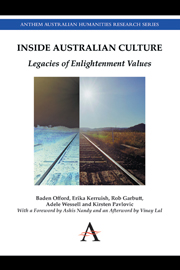Book contents
- Frontmatter
- Contents
- Foreword. Is Australia a Victim of the Ethical Limits of the Enlightenment? A Modest Foreword for an Immodest Venture
- Preface and Acknowledgements
- Chapter One Introduction
- Part One Getting Inside Australian Public Culture
- Part Two Three Moments of the Enlightenment
- Chapter Four Moment One. An Act to Regulate Chinese Immigration (1858): Celestial Migrations
- Chapter Five Moment Two. Cubillo v. the Commonwealth (2000): The ‘History Defence’ – Standards of the Time
- Chapter Six Moment Three. Australian Localism and zthe Cronulla Riot (2005): The ‘Barbaric Law’ of ‘He Who Was There First’
- Part Three Working with the Necessary Other
- Afterword. The Emptiness Within and Without: Enlightenment Australia and Its Demons
- Notes
- Index
Chapter Five - Moment Two. Cubillo v. the Commonwealth (2000): The ‘History Defence’ – Standards of the Time
from Part Two - Three Moments of the Enlightenment
Published online by Cambridge University Press: 05 October 2014
- Frontmatter
- Contents
- Foreword. Is Australia a Victim of the Ethical Limits of the Enlightenment? A Modest Foreword for an Immodest Venture
- Preface and Acknowledgements
- Chapter One Introduction
- Part One Getting Inside Australian Public Culture
- Part Two Three Moments of the Enlightenment
- Chapter Four Moment One. An Act to Regulate Chinese Immigration (1858): Celestial Migrations
- Chapter Five Moment Two. Cubillo v. the Commonwealth (2000): The ‘History Defence’ – Standards of the Time
- Chapter Six Moment Three. Australian Localism and zthe Cronulla Riot (2005): The ‘Barbaric Law’ of ‘He Who Was There First’
- Part Three Working with the Necessary Other
- Afterword. The Emptiness Within and Without: Enlightenment Australia and Its Demons
- Notes
- Index
Summary
At the least, one can say that human beings are capable of using any ideology, any faith, any idea system, in the long run, for the purposes of dominance – in the long run. So no religion, no ideology, no idea, no social theory can claim to be paramountly and irrevocably immune to human greed and violence – let me put it like that.
Interview with Ashis Nandy, 6 December 2009Our second case study turns to the effects of how law and ongoing colonialism in Australia have conspired to produce scientific, historical and political discourses where traditional cultural knowledges and values are dismissed in a colonial context. In April 1997, Bringing Them Home, the Report of the National Inquiry into the Separation of Aboriginal and Torres Strait Islander Children from the Families, was released. The inquiry uncovered widespread allegations of physical brutality and sexual abuse, and found that the forcible removal of Indigenous children breached Australian laws and international human rights obligations. The Human Rights and Equal Opportunity Commission (HREOC) recommended that the Australian government consider compensation for those forcibly removed from their families, and formally apologise. The recommendation was disregarded by the Australian government of the time, who asserted instead that there was no ‘practical or appropriate way’ to address the recommendation for monetary compensation. This disregard motivated a number of cases of litigation against federal, state and territory governments to make reparation for the practice and effects of the removal of Aboriginal children.
- Type
- Chapter
- Information
- Inside Australian CultureLegacies of Enlightenment Values, pp. 63 - 78Publisher: Anthem PressPrint publication year: 2014

